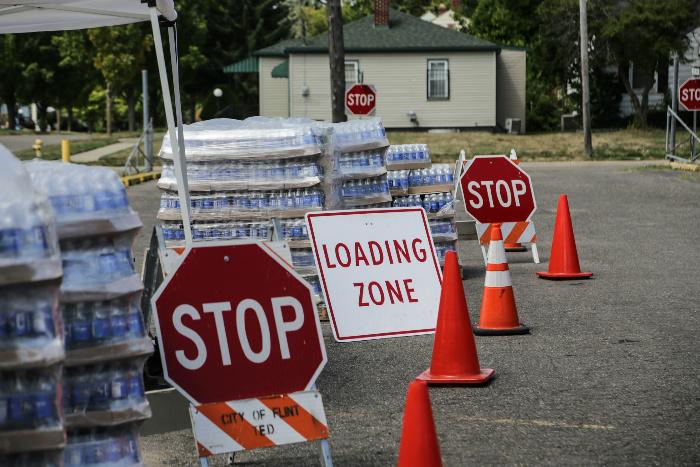Still No Solution to the Flint Water Crisis
Donated water bottles from a Community Point of Distibution site at St. Mark Missionary Baptist Church.
News of the poisoned water crisis in Flint, Michigan has reached a wide audience around the world. An overview of what happened is that the Republican governor of Flint, Rick Snyder decided to take the city off of their fresh water drinking source, Lake Huron, and instead, switch their water to the toxic Flint River in order to save money. The river water was found to be 19 times more corrosive than water from Detroit, which was from Lake Huron, according to a study by the Virginia Polytechnic Institute and State University.
Since the water wasn’t properly treated, lead from aging service lines was found in the Flint water supply after the city switched to the Flint River as its main water source. When the governor’s office discovered just how toxic the water was, they decided to keep quiet about it and covered up the extent of the damage being done to Flint’s residents.
The main health issue was that the lead was affecting the children, causing permanent brain damage, impaired cognition, behavioral disorders, hearing problems and delayed puberty. In pregnant women, lead is associated with reduced fetal growth. In everyone, lead consumption can affect the heart, kidneys and nerves, as found by studies from the National Institute of Environmental Health Studies.
Citizen activists in Flint and around the nation have done many protests in order to get media coverage, increase awareness, and to pressure law enforcement to do something about the issue at hand.
Flint, Michigan is a city located 70 miles north of Detroit with a population of 98,310 people and a majority of African Americans. 41.2% of residents live below the poverty line and the median household income is $24,862 whereas the median household income for the rest of Michigan is $49,576, according to the US Census Bureau.
The Flint water crisis was a result of systemic racism, according to a report from the Michigan Civil Rights Commission earlier this month, “The Flint Water Crisis: Systemic Racism Through the Lens of Flint.”
According to the 129-page report, “deeply embedded institutional, systemic and historical racism” indirectly contributed to the decision to use the Flint River for drinking water as a cost-saving measure in a primarily African American city.
Flint resident She’a Cobb, said according to Michigan Radio Station, “I’m just worried about people. I’m worried about my aunt’s, you know? I’m worried about my friends. I’m worried about the babies, the children that go to our schools.”





